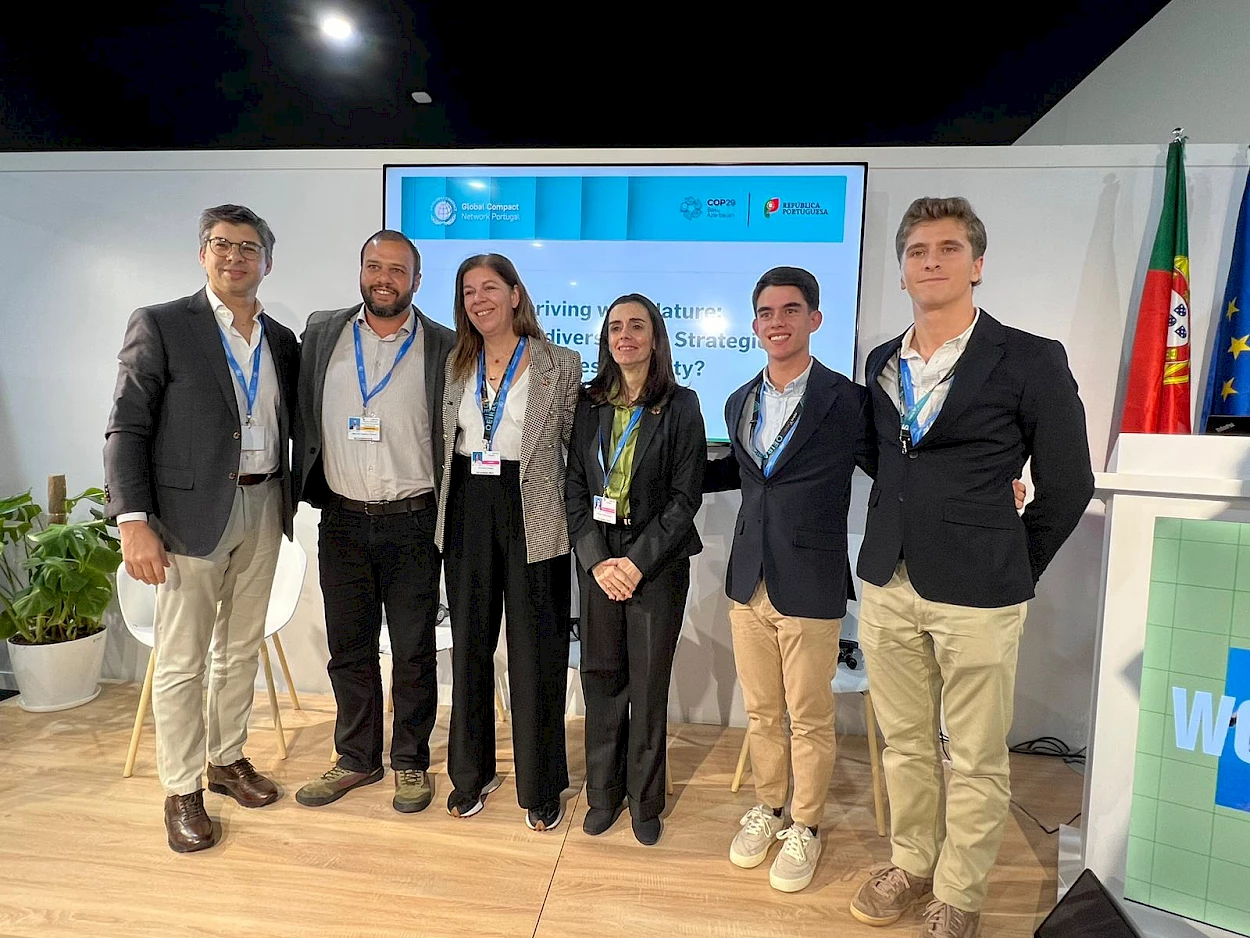University of Coimbra shares sustainability best practices at COP 29
Pro-Rector Patrícia Pereira da Silva represents UC on two panels, marking the institution's debut at the United Nations Climate Change Conference.
Patrícia Pereira da Silva with the participants of the panel "Green Leadership for a Sustainable Transition: Building Skills for a Decarbonized Future”
© DR
The University of Coimbra (UC) was officially represented for the first time at the United Nations Climate Change Conference (Conference of the Parties to the United Nations Framework Convention on Climate Change – COP), sharing its expertise and best practices in sustainability. On Monday, 18 November, UC’s Pro-Rector for Planning and Sustainability, Patrícia Pereira da Silva, took part in a panel on Green Leadership for a Sustainable Transition at the United Nations Global Compact Network Pavilion, following her participation on Saturday in a panel on biodiversity at the Portuguese Pavilion during COP 29 in Baku, Azerbaijan.
At the invitation of the UN Global Compact International Network, she participated in the panel "Green Leadership for a Sustainable Transition: Building Skills for a Decarbonised Future", alongside representatives from the Ant Group (China Country Network), Columbia University (USA), and UNESCO. During the session, she highlighted how UC "integrates sustainability into all its activities, from academic curricula to institutional practices and community initiatives".
Citing "concrete examples such as the UC Energy Community Renewable Energy Project, sustainable mobility programmes, and circular economy initiatives, alongside various Bachelor's, Master's, and Doctoral degrees focused on sustainability," which "demonstrate our commitment to educating a new generation of leaders for decarbonisation," the Pro-Rector highlighted that "there are also numerous research projects of recognised scientific merit, acknowledged as models for advancing the Sustainable Development Goals and reinforcing 'green leadership' as a core value of our institution."
"UC is committed to strengthening ethical awareness and social responsibility in all areas of education and research—fundamental elements for our students and faculty to become agents of change. In the face of an unprecedented climate emergency, our mission is clear: to educate for immediate and lasting action," she emphasised.
On Saturday, Patrícia Pereira da Silva participated in the panel "Thriving with Nature: Why Biodiversity is a Strategic Business Priority" alongside representatives from the Municipality of Oeiras, EDP, and SSE, sharing her vision that "UC recognises that the conservation of biodiversity is not only an ethical issue, but also a long-term strategy, fundamental for economic and social sustainability."
During this session, hosted by the UN Global Compact Network Portugal, she presented UC research projects such as Syberac (which studies the impact of pesticides on Bairrada vineyards) and BeSafeBeeHoney (which focuses on bee health and sustainable beekeeping), "examples, among many others, of the transformative impact we seek to achieve by promoting technologies and solutions with environmental value." Pereira da Silva also emphasised that "UC continuously invests in the sustainable management of its campuses," with initiatives such as preserving biodiversity in the Botanical Garden, reducing paper consumption by more than 600%, dematerialising processes, and improving energy management.
"These efforts are part of an institutional strategy aligned with the Sustainable Development Goals (SDGs), reinforcing our role as an agent of change," she added.
COP 29 takes place from 11-22 November in Baku, Azerbaijan.

